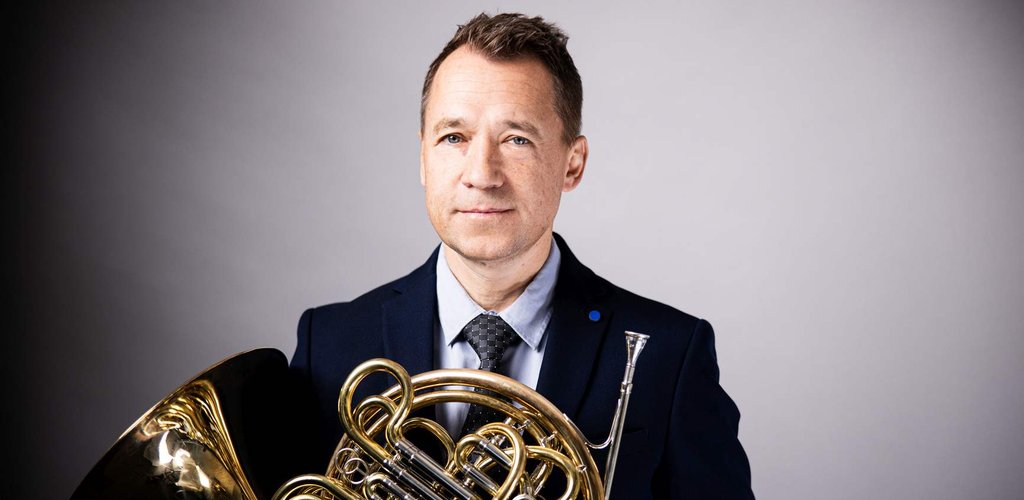Dávid Bereczky will perform the solo of Mozart’s Horn Concerto in E-flat major at the first Haydn-Mozart concert of the season. A member of the Budapest Festival Orchestra since 2001, we asked the French horn player about his choice of instrument, the playful side of Mozart and what Gábor Takács-Nagy has helped him realize about the composer’s pieces.
Júlia Váradi: How and when did the French horn become such an important instrument for you? I understand you first learned to play the violin as a child.
Dávid Bereczky: I did play the violin for five years, but I never felt that instrument to be truly mine. I come from a musical family, as both of my parents are musicians. My mother played the cello, but since I was one of many children, she did not work as a member of an orchestra. My father is a folk music researcher. All of my siblings also play instruments: the majority play string instruments like the cello or the violin, but we also have a pianist in the family.
J. V.: How many siblings do you have?
D. B.: There are eleven of us. And we have all learned to play one instrument or another. I was perhaps the most rebellious, because I quickly took issue with my instrument, the violin. I was adamant about wanting to play a brass wind. My parents and I gave it a lot of thought, and we ultimately narrowed it down to the French horn.
J. V.: What do you mean that you had to narrow it down?
D. B.: My parents cautioned me against the trumpet and the trombone, because they are such prominent instruments in jazz and pop music, and they did not want my musical training to shift in that direction. They wanted to keep me in classical music, which is how we ended up compromising and choosing the French horn. I was fourteen when I began to play this instrument, and I have been devoted to it ever since.
J. V.: What is the story of the particular instrument you are playing today? How did you end up with it?
D. B.: This instrument was hand-made by a master craftsman in the Netherlands for me. He is rather well known, but does not produce many instruments. I have been playing it for three years, and I really like it. The master tailors each instrument to the specific person, so I played for him for seven days. He listened very carefully and based on that he produced this horn. So I can really feel this instrument is mine. The French horn is a very diverse instrument, with a number of tones to it.
J. V.: I read a story about Mozart’s Horn Concerto No. 4. He was good friends with an older horn player, Joseph Leutgeb, who was known to have a great sense of humor. They used to have lots of fun together, and for instance when Mozart finished working on the score for this piece, he threw the pages of its sheet music around the room, and Leutgeb had to put them in the right order so he could play the piece. Have you heard this anecdote before?
D. B.: Yes, there are many well-known anecdotes about their friendship. They would often play billiards together, and every time Mozart lost a game, he had to compose a horn piece for his elderly friend. Leutgeb was an incredibly witty, cheerful guy – as was Mozart himself. They had a lot of fun together.
J. V.: Does the Horn Concerto in E-flat major reflect this joy and humor?
D. B.: It does have some cheerful parts, but its most typical feature is that it is an incredibly naturally composed piece, incorporating a lot of different human traits. Mozart was a brilliant composer, and is easy to play because his music is made to be performed in the most natural manner possible. If a musician is able to do so, that is already a great achievement.
J. V.: I’m sure what also helps in these cases is that the conductor, the regular leader of the Haydn-Mozart series, Gábor Takács-Nagy, also understands this perfectly himself, and this sort of natural approach is also a very important element of the performance for him, too. Is that the case?
D. B.: Yes, fortunately I have been working with him for many years, and he has helped me see many things about Mozart’s music which are important to notice and understand. Things like where the melodies come from and where they are headed; and he is very familiar with the essence of playing in a natural way. Perhaps this is so important because in today’s work, it is increasingly difficult to experience naturalness. For one reason or another, people don a variety of masks to meet expectations, so natural behavior appears to be dying out, in my view. This is precisely what Gábor Takács-Nagy is able to elicit from us: to perform the pieces in a very natural way. This is how miracles are born at his concerts.
